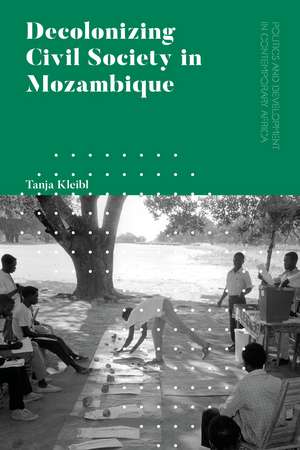Decolonizing Civil Society in Mozambique: Governance, Politics and Spiritual Systems: Politics and Development in Contemporary Africa
Autor Tanja Kleiblen Limba Engleză Paperback – 22 mar 2023
| Toate formatele și edițiile | Preț | Express |
|---|---|---|
| Paperback (1) | 190.59 lei 43-57 zile | |
| Bloomsbury Publishing – 22 mar 2023 | 190.59 lei 43-57 zile | |
| Hardback (1) | 568.22 lei 43-57 zile | |
| Bloomsbury Publishing – 22 sep 2021 | 568.22 lei 43-57 zile |
Din seria Politics and Development in Contemporary Africa
-
 Preț: 140.00 lei
Preț: 140.00 lei - 8%
 Preț: 153.16 lei
Preț: 153.16 lei -
 Preț: 144.38 lei
Preț: 144.38 lei -
 Preț: 319.33 lei
Preț: 319.33 lei -
 Preț: 307.67 lei
Preț: 307.67 lei - 21%
 Preț: 217.82 lei
Preț: 217.82 lei - 14%
 Preț: 159.11 lei
Preț: 159.11 lei - 14%
 Preț: 158.73 lei
Preț: 158.73 lei - 13%
 Preț: 161.32 lei
Preț: 161.32 lei - 13%
 Preț: 170.80 lei
Preț: 170.80 lei - 13%
 Preț: 160.87 lei
Preț: 160.87 lei - 13%
 Preț: 161.76 lei
Preț: 161.76 lei - 30%
 Preț: 570.76 lei
Preț: 570.76 lei - 23%
 Preț: 159.53 lei
Preț: 159.53 lei - 20%
 Preț: 196.08 lei
Preț: 196.08 lei - 30%
 Preț: 567.75 lei
Preț: 567.75 lei - 23%
 Preț: 197.94 lei
Preț: 197.94 lei - 23%
 Preț: 190.75 lei
Preț: 190.75 lei - 23%
 Preț: 193.18 lei
Preț: 193.18 lei - 24%
 Preț: 196.89 lei
Preț: 196.89 lei - 23%
 Preț: 193.26 lei
Preț: 193.26 lei
Preț: 190.59 lei
Preț vechi: 248.97 lei
-23% Nou
Puncte Express: 286
Preț estimativ în valută:
36.47€ • 38.18$ • 30.18£
36.47€ • 38.18$ • 30.18£
Carte tipărită la comandă
Livrare economică 07-21 aprilie
Preluare comenzi: 021 569.72.76
Specificații
ISBN-13: 9781786999351
ISBN-10: 1786999358
Pagini: 208
Dimensiuni: 156 x 234 x 25 mm
Greutate: 0.3 kg
Editura: Bloomsbury Publishing
Colecția Zed Books
Seria Politics and Development in Contemporary Africa
Locul publicării:London, United Kingdom
ISBN-10: 1786999358
Pagini: 208
Dimensiuni: 156 x 234 x 25 mm
Greutate: 0.3 kg
Editura: Bloomsbury Publishing
Colecția Zed Books
Seria Politics and Development in Contemporary Africa
Locul publicării:London, United Kingdom
Caracteristici
Linking post-colonial thinking with practice (in the field of civil society) is something rarely realized in research and development; this book provides insights into new conceptual thinking of highest relevance to both development theory and practice and more generally debates on the post-colonial situation
Notă biografică
Tanja Kleibl is currently Professor of Social Work, Migration and Diversity at the University of Applied Sciences Würzburg-Schweinfurt, Germany and Research Associate at the University of Johannesburg, South Africa.
Cuprins
Introduction: Civil Society - a Functional or Transformative Concept?Part I: Interrogating Civil Society in the Development DiscoursePart II: Civil Society in MozambiquePart III: Governance and Civil Society in MozambiquePart IV: Civil Society in the Context of Economic Disorder and Political ConflictConclusion: Identifying and Pushing the Post-colonial Boundaries
Recenzii
An unflinching critique of the unproblematized transfer of philosophies that underpin Western conceptualization of civil society to Mozambique in particular and Africa in general. This book unravels how the civil in civil society is lost through co-option by an authoritarian state and the concomitant exclusion of the marginalized and powerless.
Decolonizing Civil Society in Mozambique makes a serious contribution to the study of Mozambique from an engaged decolonial perspective. It ranges widely across social theory but it is always grounded. Students of development studies and of contemporary Africa will find it fascinating. It is also a fine contribution towards decolonizing the curriculum.
A fascinating analysis of civil society in Mozambique that is both timely and important. Kleibl manages to critically engage the complexities of civil society relations that both challenges our theoretical, as well as empirical understanding of a phenomenon we tend to take for granted. Decolonizing Society in Mozambique raises important questions related to the Frelimo state's uneasy relationship to society in all its manifestations.
Professor Kleibl interrogates the whole notion of decolonization from the lens of civil society, while focusing on the socio-political and economic context of Mozambique. In her exposition, Professor Kleibl unpacks the historical, political, economic, spiritual and religious realities that influence the conceptual understanding of civil society in a given context and outlines the major dynamics linked to civil society encountered in Mozambique.
Decolonizing Civil Society in Mozambique makes a serious contribution to the study of Mozambique from an engaged decolonial perspective. It ranges widely across social theory but it is always grounded. Students of development studies and of contemporary Africa will find it fascinating. It is also a fine contribution towards decolonizing the curriculum.
A fascinating analysis of civil society in Mozambique that is both timely and important. Kleibl manages to critically engage the complexities of civil society relations that both challenges our theoretical, as well as empirical understanding of a phenomenon we tend to take for granted. Decolonizing Society in Mozambique raises important questions related to the Frelimo state's uneasy relationship to society in all its manifestations.
Professor Kleibl interrogates the whole notion of decolonization from the lens of civil society, while focusing on the socio-political and economic context of Mozambique. In her exposition, Professor Kleibl unpacks the historical, political, economic, spiritual and religious realities that influence the conceptual understanding of civil society in a given context and outlines the major dynamics linked to civil society encountered in Mozambique.
